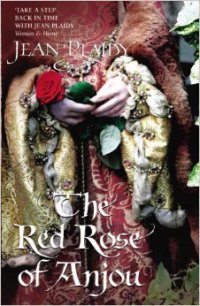Daughters of Spain - Plaidy Jean (онлайн книга без TXT) 📗
‘I want you to ride with all speed to Medina del Campo,’ she said. ‘I shall follow, but necessarily more slowly. My daughter is behaving … strangely.’
She explained what was happening, and within an hour of leaving her the two set off, while Isabella herself made preparations to depart.
When Ximenes and Henriquez arrived at Medina, the Bishop received them with the utmost relief. He was frantic with anxiety, for Juana still remained, immobile, her features set in grim purpose, her feet and hands blue with cold, seated on the ground with her back against the buttress by the gate of the Palace.
When the gates were opened to admit Ximenes and Henriquez she tried to rise, but she was numb with the cold and the gates had been shut again before she could reach them.
Ximenes thundered at her; she must go to her apartments at once. It was most unseemly, most immodest for a Princess of the royal House to be seen wandering about half clad.
‘Go back to your University,’ she cried. ‘Go and get on with your polyglot Bible. Go and torture the poor people of Granada. But leave me alone.’
‘Your Highness, it would seem that all sense of decency has deserted you.’
‘Save your words for those who need them,’ she spat at him. ‘You have no right to torture me, Ximenes de Cisneros.’
Henriquez tried with softer words.
‘Dearest cousin, you are causing us distress. We are anxious on your account. You will become ill if you stay here thus.’
‘If you are so anxious about me, why do you stop my joining my husband?’
‘You are not stopped, Highness. You are only asked to wait until the weather is more suited to the long journey you must make.’
‘Leave me alone,’ she snarled.
Then she hung her head and stared at the ground, and would not answer them.
Ximenes was pondering whether he would not have her taken in by force, but it was not easy to find those who would be ready to carry out such instructions. This was the future Queen of Spain.
He shuddered when he thought of her. She was inflicting suffering on her body as he himself had so many times. But for what different purpose! He had mortified his flesh that he might grow to greater saintliness; she mortified hers out of defiance because she was denied the gratification of her lust.
Juana spent the next night in the hut, and again at daybreak she was at her post at the gates. And that morning Isabella arrived.
As soon as the Queen entered she went straight to her daughter. She did not scold her, or speak of her duty; she merely took Juana into her arms, and for the first time Isabella broke down. The tears ran down her cheeks as she embraced her daughter. Then, still weeping, she took off her heavy cloak and wrapped it about Juana’s cold form.
Then Juana seemed to forget her purpose. She gave a little cry and whispered: ‘Mother, oh my dear Mother.’
‘I am here now,’ said Isabella. ‘All is well. Mother is here.’
It was as though she were a child again. The years seemed to drop from her. She was the wild Juana who had been guilty of some mischief, who had been punished, and who was frightened and uncertain and wanted only the comfort and reassurance her mother could give.
‘We are going inside now,’ said the Queen. ‘Then you and I will talk. We will make plans and discuss all that you wish to discuss. But, my darling, you are so cold and you are so weak. You must do what your mother says. Then you will be strong and well enough to join your husband in Flanders. If you are sick you could not, could you? Nor would he want a sick wife.’
Isabella, with those few words, had been able to do what the fire of Ximenes, the persuasion of Henriquez and the entreaties of Burgos had failed to do.
Her arm about her daughter, the Queen led Juana into the Palace.
Now that the final blow had fallen on Isabella – that which she had dreaded for so long and which could now not be denied – her health gave way.
She was so ill that for days she could do nothing but keep to her bed. She was unable to make her journeys with Ferdinand, and this was indeed an anxious time for Spain, for the French were threatening invasion.
With the coming of the spring Juana left for Flanders. Isabella said a fond farewell to her daughter, certain that she would never see her again. She did not attempt to advise her, because any advice she gave would not be heeded.
Isabella was aware that her grip on life was no longer very strong.
Even as she embraced Juana she was telling herself that she must put her affairs in order.
Juana rode joyfully to the coast. The people cheered as she went. There were many in the country villages who did not know of her madness, and who believed that she had been cruelly kept a prisoner, separated from her husband.
As she went, smiling graciously, there was nothing of the mad woman about her. When she was peacefully happy, Juana appeared to be completely sane; and she was happy now because she was going to be with Philip.
There was a delay at Laredo before the sea journey could be attempted, and during that time Juana began to show signs of stress, but before her madness could take a grip of her she was at sea.
What joy it was to be in Brussels again. She was a little worried when Philip did not come to the coast to meet her. Those of her attendants who knew the signs of wildness watched her intently and waited.
In the Palace Philip greeted her casually as though they had not been separated for months. But if she were disappointed she was so delighted to be near him again that she did not show this.
He spent the first night of her arrival with her and she was ecstatically happy; but it was not long before she discovered that his attention was very much occupied elsewhere.
He had a new mistress, one on whom he doted, and it did not take Juana very long to discover who this was. There were many malicious tongues eagerly waiting for the opportunity to point the woman out to her.
When Juana saw her, waves of anger rose within her. This woman had the physique of a Juno. She was a typical Flemish beauty, big-hipped, big-breasted, with a fresh complexion, but the most startling thing about her was her wonderful golden hair; abundant, it fell curling about her shoulders to beyond her waist, and it was clear that she was so proud of it that she invariably wore it loose and was actually setting a new fashion at the Court.
For days Juana watched that woman, hatred growing within her. For nights when she lay alone hoping that Philip would come to her she thought of that woman and what she would do to her if she could lay her hands upon her.
Philip neglected her completely now and the frustration of being so near him and yet denied his company was as great as that of being a prisoner in Medina del Campo.
Philip had to leave Court for a few days, and to Juana’s great joy he did not take his golden-haired mistress with him.
With Philip away Juana could give her orders. She was his wife, the Princess of Spain, the Archduchess of Flanders. He could not take that away from her and give it to the long-haired wanton.
Juana was wild with excitement. She summoned her women to her, and demanded that her husband’s mistress be brought before her.
There she stood, insolent, knowing her power, fully realising Juana’s love and need of Philip; in her eyes was a look of pitying insolence as though she were remembering all that she enjoyed with Philip, which favours were denied to his wife.
Juana cried: ‘Have you brought the cords I asked for?’
And one of the women answered that she had.




